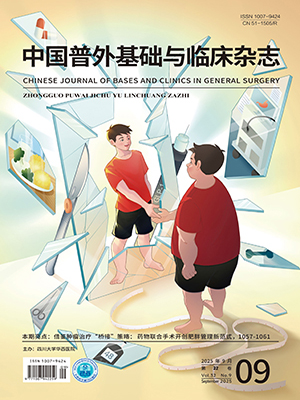ObjectiveTo investigate the status of undernutrition, nutritional risk as well as nutritional support in patients with gastrointestinal tumor. MethodsIn this prospective cohort study, patients with gastrointestinal tumor were recruited from Septemper 2009 to June 2011. Patients were screened by using Nutritional Risk Screening 2002 (NRS2002) at admission. Data of the nutritional risk, application of nutritional support, complications, and tumor staging were collected. ResultsNine hundred and sixty-one patients with gastrointestinal tumor were recruited, the overall prevalence of nutritional risk was 38.9% (374/961) at admission, 49.2% (176/358) in gastric tumor and 32.8% (198/603) in colorectal tumor, respectively. The highest prevalence was found in stage Ⅳ gastric tumor 〔87.3% (48/55)〕 and colorectal tumor 〔58.8% (50/85)〕 while the lowest prevalence was found in stage ⅡA gastric tumor 〔16.1% (5/31)〕 and stageⅠcolorectal tumor 〔9.8% (6/61)〕. 62.3% (152/244) of gastric tumor patients with nutritional risk while 48.6% (144/296) without nutritional risk received nutritional support. 37.7% (92/244) of colorectal tumor patients with nutritional risk while 51.4% (152/296) without nutritional risk received nutritional support. The ratio of parental nutrition and enteral nutrition was 1.251. The rate of complications in the gastrointestinal tumor patients with nutritional risk was higher than that in the patients without nutritional risk 〔32.4% (121/374) versus 20.4% (120/587), P=0.000 0〕. For the gastrointestinal tumor patients with nutritional risk, the complication rate of the patients with nutritional support was significantly lower than that of the patients without nutritional support 〔27.5% (67/244) versus 40.8% (53/130), P=0.008 6〕. For the gas trointestinal tumor patients without nutritional risk, the complication rate of gastric tumor patients with nutritional support was significantly lower than that of the patients without nutritional support (P=0.039 6), while the complication rate was not significantly different in the colorectal tumor patients with nutritional support or not (P=0.464 7). ConclusionsPatient with gastrointestinal tumor has a high nutritional risk which is related to tumor staging. Patients with nutritional risk have more complications, and nutritional support is beneficial to the patients with nutritional risk by a lower complication rate.
Citation: JIA Zhenyi,QIN Huanlong.. Investigation of Nutritional Risk and Nutritional Support in Patients with Gastrointestinal Tumor. CHINESE JOURNAL OF BASES AND CLINICS IN GENERAL SURGERY, 2011, 18(12): 1254-1258. doi: Copy
Copyright © the editorial department of CHINESE JOURNAL OF BASES AND CLINICS IN GENERAL SURGERY of West China Medical Publisher. All rights reserved




